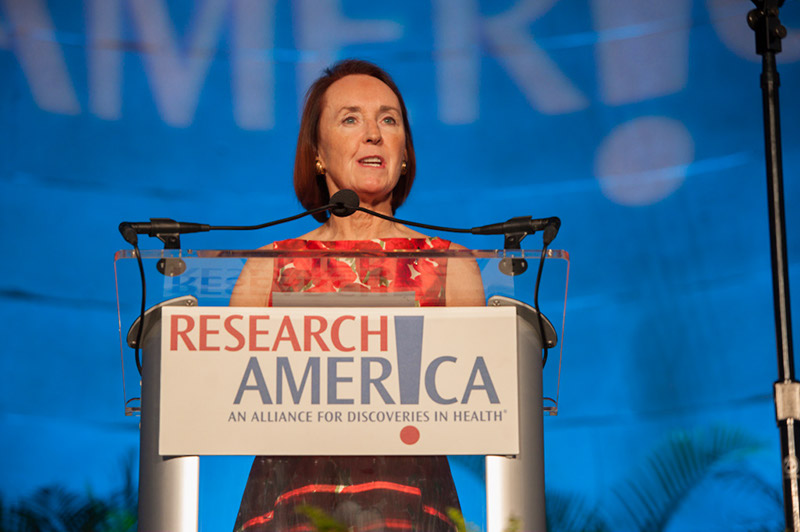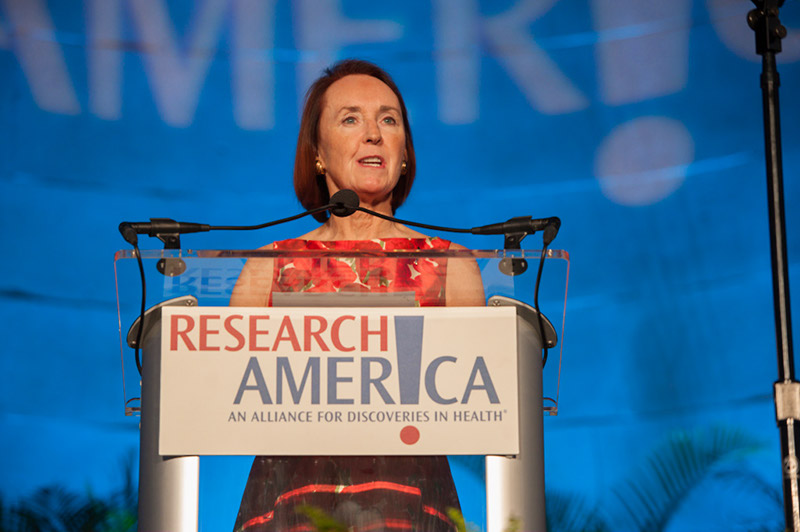No Rescission

 First, thank you for helping us thank “Labor-H” appropriations subcommittee leaders and their respective staff members for their crucial role in securing robust FY18 funding to drive faster medical and public health progress. The final letter was 154 signatures strong… a well-deserved show of appreciation!
First, thank you for helping us thank “Labor-H” appropriations subcommittee leaders and their respective staff members for their crucial role in securing robust FY18 funding to drive faster medical and public health progress. The final letter was 154 signatures strong… a well-deserved show of appreciation!
(Almost) unbelievably, however, the FY18 funding saga continues. Even though the FY18 omnibus has been signed into law, news broke this week that House Majority Leader Kevin McCarthy (R-CA) and President Trump are discussing whether to pursue cuts to the non-defense discretionary funding in it. Under a provision in a 1974 law, the president would formally propose these cuts, or “rescissions,” and Congress would need to act on his proposal within a 45-day window.
As I noted in an interview yesterday with the Roanoke Times, the National Institutes of Health (NIH) lost significant purchasing power over a decade’s time, compromising our nation’s ability to support vital research. The FY18 funding boost is well justified, whether the litmus test is opportunity or need. Even if NIH were spared in a rescissions package, which is by no means a given, there would almost certainly be equally senseless cuts to NSF, FDA, CDC, AHRQ and other crucial science agencies. Advocates must take a stand…and do so quickly. Please send your Representative and Senators a quick note using this editable template to urge them not to support any rescissions. Or tweet: “No #rescissions, #fundscience. Diseases like Alzheimer’s demand answers. Don’t backtrack on the budget.” @realdonaldtrump, @GOPLeader.
At the same time that retroactive changes to FY18 spending are being discussed, members of Congress are moving ahead full steam on FY19 appropriations. NIH Director Dr. Francis Collins is scheduled to testify before the House Labor-H Subcommittee on Wednesday, April 11 at 10:00 AM ET. Senators Bob Casey (D-PA) and Richard Burr (R-NC) are circulating a letter in support of robustly funding the NIH in FY19. Use this editable email to ask your Senators to sign on.
At the risk of sounding like a broken record (I wonder how old you need to be to get that reference), the formula for faster medical and public health progress includes both robust funding and sound policy. On the latter front, two particularly thorny issues received attention in Washington this week: FDA Commissioner Gottlieb outlined FDA’s efforts to refine the benefit-risk assessment process, a challenge that involves trade-offs – sometimes life and death tradeoffs – between safety, the pace of progress and who benefits from it; and the Bipartisan Policy Center released a report on intellectual property issues related to therapeutic antibodies, a lightning rod topic that speaks to the line – continuously needing to be redrawn as science evolves – between incentivizing medical innovation and curtailing it. More on these issues in the weeks and months to come, and as always, if we can be helpful as your organization determines whether and how to weigh in, please let me or Ellie know.
This is National Public Health Week (NPHW), and the focus on public health is always welcome. Recently, CDC Director Dr. Robert Redfield asserted that the AIDS epidemic could end in the U.S. within the next three to seven years. Achieving that truly admirable goal and meeting other public health priorities requires resources as well as visionary leadership. While CDC received a funding boost for FY18, historical funding trends reveal dangerous long-term erosion in the agency’s purchasing power. Now is the time for Congress to provide CDC the resources it needs. As you are making your FY19 appropriations request for CDC, use our fact sheet to help make the case!
The public health crisis most in the news is the opioid epidemic. Yesterday, NIH Director Collins announced the launch of the HEAL (Helping to End Addiction Long-term) Initiative, which features public-private partnerships focused on identifying new non-addictive pain medications. On Tuesday, HHS Secretary Azar announced that Dr. Brett Giroir, in addition to his duties as Assistant Secretary for Health, will serve as Secretary Azar’s Senior Advisor for Mental Health and Opioid Policy. Dr. Giroir joined our Advocacy Awards Dinner last month, and we look forward to working with him as he helps chart the Department’s course on these crucially important issues. Surgeon General Adams is also playing a pivotally important role: today he issued a rare advisory encouraging more people to carry the overdose-reversal medication naloxone. There will and should be more news and more action combating the opioid epidemic on all fronts.
Did you know that nearly one in four U.S. households include someone with migraine? I urge you to join us on Wednesday, April 11 at 3:00 p.m. ET for our webinar about migraine research challenges (and opportunities) with speakers representing government, academia, research and patients – more info here.
Sincerely,
Mary Woolley




